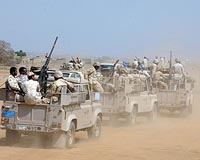 |
Kabul (AFP) Aug 16, 2010 Increased fighting between the Taliban and NATO on the doorstep of Afghanistan's capital reflects the growing difficulties faced by the United States' landmark counter-insurgency strategy. As US-led forces try to secure large towns and cities from Taliban infiltration, the lesson from Kabul's southwest fringe is that extra troops are alienating war-weary residents who resent central control. Over the past 18 months nearly 4,000 US soldiers have poured into the provinces of Wardak and Logar, both Taliban hotbeds neighbouring Kabul. The increased presence is part of a general surge ordered by President Barack Obama under a counter-insurgency strategy designed to reverse the Taliban's momentum and allow American forces to start withdrawing next year. The Taliban were chased out of the area when their government was toppled in the 2001 US-led invasion, but returned in 2005, exploiting poor development and governance just a stone's throw from the capital. A Western security official, speaking on condition of anonymity, said the deployment of new American units had made things worse. "We've definitely seen a rise in the number of incidents this year, especially in the Pashtun districts," he said. In Sayedabad and Jaratu districts, NATO and Afghan forces come under regular attack. Mohammad Atik, 50, recently fled his family home in Jaratu for the relative safety of Kabul. The family, he says, were "caught between fire from both sides". "People are afraid," he said. "Taliban rockets destroy our houses and we're scared that we'll be bombed by NATO or targeted by their night operations." That fear can sway allegiances. "Given the situation now, we would rather see the US go and be ruled by the Taliban again," admitted Atik. Khan Mohammad, 35, who also fled Jaratu for Kabul, agrees. "People don't always like the Taliban, but they accept them because they're afraid," he said. A tribal elder who refused to be named said the Taliban were also winning sympathy by offering money to the jobless among the largely illiterate, rural population of Wardak, 70 percent of whom are Pashtuns -- the ethnic group that makes up the bulk of Taliban foot soldiers. Despite the proximity to the seat of government and NATO central command in Afghanistan, Wardak residents are notoriously hostile to rule from Kabul and the government has designated most districts "high risk". "Aside from the officials' compounds, the government doesn't control anything in five out of the province's nine districts," said Waheedullah Qarimzai, a businessman and candidate in next month's parliamentary elections. And Obama's promise to start bringing American forces home in 2011 appears only to have sown confusion. "People don't understand the US strategy. They say they will leave soon, but at the same time they send additional troops," said Atik. "Everybody in Jaratu thinks they're here to stay for a long time, whatever the situation on the ground". Illustrating the difficulties, several hundred Afghans last week staged an angry protest against the increased NATO presence, shouting "Death to America!" after an operation killed three people in the Sayedabad district of Wardak. District chief Nimatullah Mirkhel said coalition forces had killed three civilians when they stormed a house in the village of Zarin Khil, although NATO said the dead were militants. The controversy did nothing to counter the perception that foreign troops mean extra danger, despite the provincial governor's assertion that security has improved in the past two years. "We can't solve problems overnight. We have to be very patient," said governor Aleem Fedayi, 38, who was appointed in July 2008. "But the enemy has lost momentum, they are not in a position to attack one district. They can only fire rockets." Not everyone agrees. While some residents acknowledge that NATO have pushed the Taliban outside villages into the mountains, they say insurgents often return at night and have begun causing more damage by launching attacks from farther away. "At night, the district is left to the Taliban," said Jaratu resident Shahir Khan. "Now that the US are there, (insurgents) fire from further away.... So they fire rockets randomly, and they regularly destroy our houses," said Atik.
Share This Article With Planet Earth
Related Links News From Across The Stans
 US intensifies strikes at Al-Qaeda targets: report
US intensifies strikes at Al-Qaeda targets: reportWashington (AFP) Aug 14, 2010 The US military conducted in May a secret air strike against a suspected Al-Qaeda target in Yemen and killed a deputy provincial governor in the process, The New York Times reported late Saturday. Citing unnamed US officials, the newspaper said the air strike hit a group of suspected operatives for Al-Qaeda in the remote desert of Marib Province. But it also killed the province's deputy ... read more |
|
| The content herein, unless otherwise known to be public domain, are Copyright 1995-2010 - SpaceDaily. AFP and UPI Wire Stories are copyright Agence France-Presse and United Press International. ESA Portal Reports are copyright European Space Agency. All NASA sourced material is public domain. Additional copyrights may apply in whole or part to other bona fide parties. Advertising does not imply endorsement,agreement or approval of any opinions, statements or information provided by SpaceDaily on any Web page published or hosted by SpaceDaily. Privacy Statement |